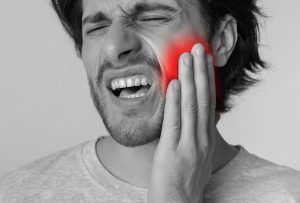Why You Should Treat TMJ Pain
TMJ (temporomandibular joint) disorders can cause uncomfortable and painful symptoms. When left untreated, TMJ disorders can lead to severe consequences. Explore the risks of untreated TMJ disorders and why seeking TMJ treatment is crucial for your overall health.
If you’re looking for TMJ treatment in Vero Beach, contact our dentist today by calling (772) 778-5550.
Seven Reasons Why You Shouldn’t Ignore TMJ Disorders
Chronic Jaw Pain
One of the most common symptoms of temporomandibular joint disorder is chronic jaw pain. Chronic pain can make it difficult to eat, speak, and even sleep. When left untreated, the pain can become more severe and chronic, making it harder to manage and live a high-quality life. This pain can affect your daily activities, such as eating, speaking, and even sleeping.
Joint Damage
The temporomandibular joint is a complex joint that allows for a wide range of movement. When something goes wrong with this joint, it can cause long-lasting damage to the joint itself. If left untreated, TMJ disorders can lead to joint damage, making it difficult or impossible to open your mouth.
Tooth Loss
TMJ disorders can cause excessive wear and tear on the teeth, leading to tooth loss over time. This is because the jaw joint and surrounding structures are responsible for guiding the movement of the teeth during chewing and speaking. Our skilled dentist in Vero Beach can provide personalized treatments for your TMD-related dental problems.
Sleep Apnea
TMJ disorders can also lead to sleep apnea, a condition in which breathing is interrupted during sleep. This occurs because the disorder can affect the muscles that control the airway, leading to snoring and other breathing problems. A TMJ disorder and sleep apnea can play off each other, resulting in a cycle of worsened symptoms.
Mental Health Issues
Chronic jaw pain and discomfort can take a toll on your mental health, leading to anxiety and depression. TMJ disorders can also cause stress and difficulty concentrating, making it harder to manage daily tasks. Take control of your physical and mental health by seeking treatment for TMD with Dr. Jonothan Royal.
Recurring Migraines
TMJ disorders can cause recurring migraines, which can be debilitating and interfere with daily activities. Treating the underlying TMJ disorder can help reduce the frequency and severity of these headaches.
Tinnitus
TMJ disorders can cause ringing or buzzing in the ears, known as tinnitus. This can be a frustrating and distracting symptom, and treating the underlying TMJ disorder can help reduce the severity of tinnitus.
Long-Term Consequences of Untreated TMJ Disorder
If TMJ disorder is left untreated, the risks mentioned above can evolve into more severe, long-term consequences.
Degenerative Joint Disease (Osteoarthritis)
Chronic inflammation of the TMJ can lead to the breakdown of the cartilage that cushions the joint, resulting in degenerative joint disease or osteoarthritis. This condition can cause persistent pain, stiffness, and reduced mobility, making it difficult for patients to perform basic functions.
Myofascial Pain Syndrome
Untreated TMJ disorder can contribute to the development of myofascial pain syndrome, a chronic pain condition affecting the muscles and connective tissues around the jaw. This condition is characterized by trigger points—painful knots in the muscles—that can cause referred pain to other areas of the body, such as the neck, shoulders, and back.
Permanent Jaw Damage
Over time, untreated TMJ disorder can cause permanent damage to the jaw joint, including the development of bone spurs, joint erosion, or dislocation. This damage may require surgical intervention to repair and can lead to long-term pain and disability.
Increased Risk of Need for Surgery
Patients who ignore TMJ disorder may eventually require surgery to correct the condition. Surgical procedures, such as arthroscopy or open-joint surgery, are invasive and carry risks, including infection, nerve damage, and prolonged recovery periods. Early treatment of TMJ disorder can often prevent the need for surgery.
Frequently Asked Questions
Do TMJ Disorders get progressively worse?
In some cases, TMJ disorders can get progressively worse if left untreated. This is because the underlying causes of the disorder, such as arthritis or jaw misalignment, can worsen over time. It’s critical to seek treatment for TMJ disorders to prevent the condition from becoming more severe.
Can TMJ cause long-term damage?
Yes. If left untreated, TMJ disorders can cause long-term damage to the jaw joint and surrounding structures. This can lead to chronic pain, difficulty chewing, and other complications. It’s essential to seek treatment for TMD pain before it worsens.
When does TMJ pain become serious?
TMJ disorders become serious when they interfere with your daily activities, such as eating or speaking. Seek medical attention if the pain or other symptoms associated with the disorder become severe or unbearable. Your dentist can create a personalized treatment plan to address your unique needs.
When does TMJ pain require surgery?
In most cases, TMJ disorders can be treated with conservative measures, such as lifestyle changes, dental appliances, or medication. Surgery is typically recommended only for severe cases of TMD that have not responded to other treatments. Your dentist or doctor can determine whether surgery is necessary based on the severity of your symptoms and the underlying cause of your TMJ disorder.
Don’t Let Jaw Pain Take a Toll on Your Health Any Longer
Do you have an untreated TMJ disorder? Seek the treatment you need to avoid developing further problems. Contact our dental office in Vero Beach today to schedule an appointment. Get started by calling (772) 778-5550.

Get Your Complimentary
Consultation or 2nd Opinion
- Exam
- Full mouth X-ray
- Private Consultation with Doctor ($350 value)
- 3036 20th St,
Vero Beach, FL 32960 - (772) 778-5550
Working hours
- Monday: 8am - 5pm
- Tuesday: 8am - 5pm
- Wednesday: 8am - 5pm
- Thursday: 8am - 5pm
- Friday: 8am - 1pm
- Saturday & Sunday: Closed


